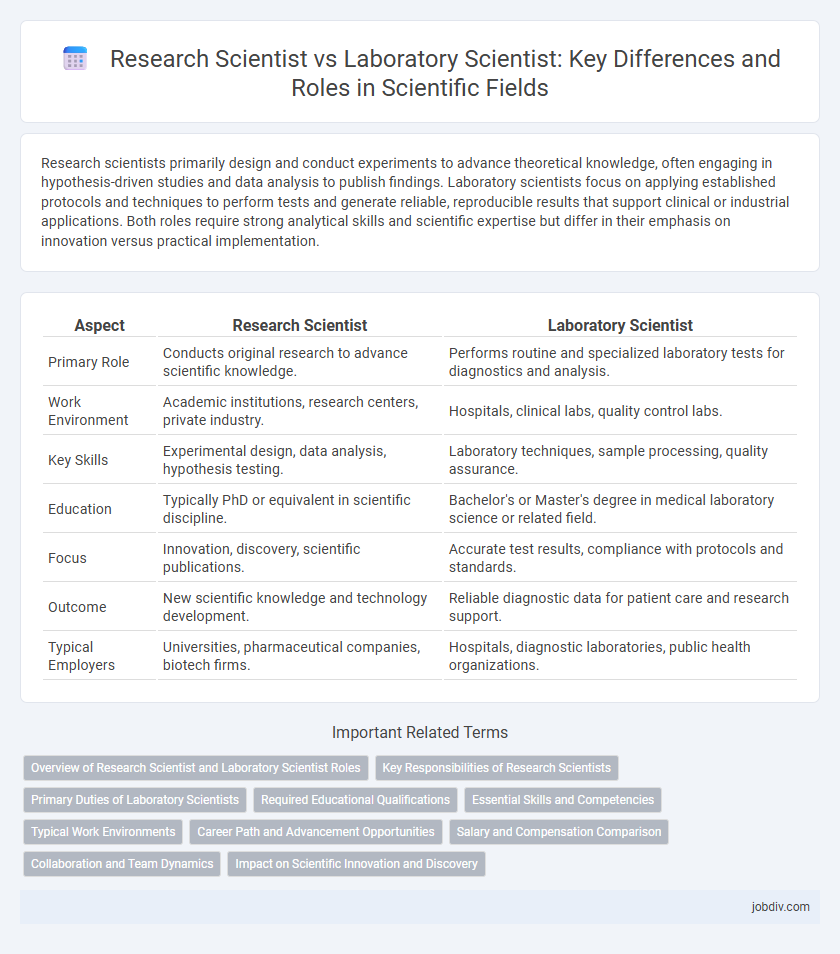Research scientists primarily design and conduct experiments to advance theoretical knowledge, often engaging in hypothesis-driven studies and data analysis to publish findings. Laboratory scientists focus on applying established protocols and techniques to perform tests and generate reliable, reproducible results that support clinical or industrial applications. Both roles require strong analytical skills and scientific expertise but differ in their emphasis on innovation versus practical implementation.
Table of Comparison
| Aspect | Research Scientist | Laboratory Scientist |
|---|---|---|
| Primary Role | Conducts original research to advance scientific knowledge. | Performs routine and specialized laboratory tests for diagnostics and analysis. |
| Work Environment | Academic institutions, research centers, private industry. | Hospitals, clinical labs, quality control labs. |
| Key Skills | Experimental design, data analysis, hypothesis testing. | Laboratory techniques, sample processing, quality assurance. |
| Education | Typically PhD or equivalent in scientific discipline. | Bachelor's or Master's degree in medical laboratory science or related field. |
| Focus | Innovation, discovery, scientific publications. | Accurate test results, compliance with protocols and standards. |
| Outcome | New scientific knowledge and technology development. | Reliable diagnostic data for patient care and research support. |
| Typical Employers | Universities, pharmaceutical companies, biotech firms. | Hospitals, diagnostic laboratories, public health organizations. |
Overview of Research Scientist and Laboratory Scientist Roles
Research Scientists design and conduct experiments to advance scientific knowledge, often working on hypothesis-driven projects and publishing findings in peer-reviewed journals. Laboratory Scientists focus on the practical application of scientific techniques, performing routine tests and analyses to support clinical or industrial processes. Both roles require strong technical skills, but Research Scientists emphasize innovation and discovery, while Laboratory Scientists prioritize accuracy and consistency in testing.
Key Responsibilities of Research Scientists
Research Scientists primarily design experiments, analyze complex data sets, and develop new theories or technologies within specific scientific domains. They conduct original research to advance knowledge, publish findings in peer-reviewed journals, and often collaborate with interdisciplinary teams to achieve innovative results. Emphasis on hypothesis-driven investigation and data interpretation distinguishes Research Scientists from Laboratory Scientists, who focus more on routine testing and maintaining lab equipment.
Primary Duties of Laboratory Scientists
Laboratory scientists primarily conduct experiments, analyze samples, and maintain laboratory equipment to ensure accurate and reliable test results. Their duties include preparing reagents, calibrating instruments, and documenting procedures in accordance with regulatory standards. This role emphasizes hands-on technical skills and routine testing, differentiating it from research scientists who focus on experimental design and hypothesis-driven investigations.
Required Educational Qualifications
Research Scientists typically require advanced degrees such as a Master's or Ph.D. in fields like biology, chemistry, or physics to design and conduct experimental studies. Laboratory Scientists often hold a Bachelor's degree in medical laboratory science, biology, or a related field, with certifications such as ASCP or equivalent to perform diagnostic tests and manage laboratory workflows. Both roles demand strong analytical skills, but Research Scientists emphasize research methodologies, while Laboratory Scientists focus on practical laboratory techniques and diagnostics.
Essential Skills and Competencies
Research Scientists excel in experimental design, data analysis, and hypothesis testing, requiring strong analytical thinking and problem-solving abilities to drive innovation. Laboratory Scientists specialize in precise laboratory techniques, quality control, and adherence to safety protocols, demonstrating meticulous attention to detail and technical proficiency. Both roles demand proficiency in scientific instrumentation, data interpretation, and collaborative communication within multidisciplinary teams.
Typical Work Environments
Research Scientists primarily work in academic institutions, government agencies, or private research facilities, where they design and conduct experiments to advance scientific knowledge. Laboratory Scientists usually operate within clinical or diagnostic laboratories, hospitals, and pharmaceutical companies, focusing on analyzing samples and supporting patient care. Both roles demand a controlled, sterile environment, but Research Scientists often engage in fieldwork or collaborative projects beyond the laboratory setting.
Career Path and Advancement Opportunities
Research Scientists primarily engage in hypothesis-driven investigations and publish findings in scientific journals, positioning themselves for roles such as principal investigator or lead researcher. Laboratory Scientists focus on executing experimental protocols and managing laboratory operations, offering advancement through specialization or supervisory roles within clinical or industrial labs. Career progression for Research Scientists often involves securing grants and leading projects, while Laboratory Scientists may advance by gaining certifications and expertise in advanced analytical techniques.
Salary and Compensation Comparison
Research scientists typically earn higher salaries than laboratory scientists due to advanced degrees and specialized expertise, with median annual wages often exceeding $80,000 compared to $50,000 to $60,000 for laboratory scientists. Compensation packages for research scientists frequently include performance bonuses, grants, and funding opportunities, enhancing total earnings beyond base pay. Laboratory scientists generally receive stable salaries with benefits but less variability and fewer supplementary financial incentives.
Collaboration and Team Dynamics
Research Scientists and Laboratory Scientists both play crucial roles in scientific discovery, with Research Scientists primarily focusing on hypothesis-driven studies while Laboratory Scientists execute experimental protocols. Effective collaboration between these professionals enhances data accuracy and accelerates innovation by combining theoretical insights and practical expertise. Team dynamics benefit from clear communication and role delineation, fostering an environment where interdisciplinary knowledge is leveraged for more robust scientific outcomes.
Impact on Scientific Innovation and Discovery
Research scientists drive scientific innovation by designing and conducting experiments that explore new hypotheses, often leading to groundbreaking discoveries and development of novel technologies. Laboratory scientists provide essential technical expertise and maintain experimental accuracy, ensuring the reliability and reproducibility of research findings critical for validating innovative concepts. Both roles synergistically contribute to advancing scientific knowledge, with research scientists focusing on conceptual breakthroughs and laboratory scientists supporting robust data generation.
Research Scientist vs Laboratory Scientist Infographic

 jobdiv.com
jobdiv.com